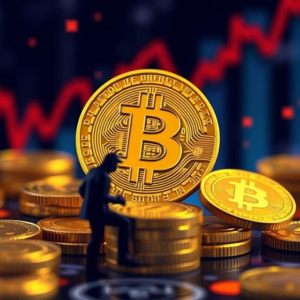Cryptocurrencies are edging closer to mainstream adoption, and now, the United States has made a bold statement in support of digital assets.
The government’s decision to establish a strategic Bitcoin reserve marks a critical moment in crypto history. But as the markets react to this unprecedented move, opinions remain divided.
Will this decision stabilize the cryptocurrency landscape, or introduce new hurdles? Read on to uncover the details, market responses, and expert insights on this groundbreaking development.
What Led to This Decision?
The establishment of a strategic Bitcoin reserve by the United States is not a decision made in isolation. It stems from a growing recognition of cryptocurrency’s impact on the global financial system, as well as its potential to serve as a hedge against economic uncertainty. With inflation concerns lingering and geopolitical tensions rising, Bitcoin is increasingly being viewed as “digital gold”—a store of value that transcends traditional financial and political boundaries. Analysts speculate that the government’s move may also be a strategic attempt to position itself as a leader in the digital economy, ensuring its competitiveness in a rapidly digitizing world.
Market Reactions and Volatility
Unsurprisingly, the market reactions have been anything but calm. Bitcoin prices skyrocketed in the immediate aftermath of the announcement, with many investors interpreting the move as a signal of mainstream validation. However, this rally was soon met with heightened volatility, as skeptics raised questions about potential regulatory implications and the broader impact on decentralized systems. Some fear that such government involvement could pave the way for greater control over the crypto space, potentially undermining the principles of decentralization that Bitcoin was built upon.

What Led to the Creation of a Bitcoin Reserve?
The concept of a strategic Bitcoin reserve appears to have taken shape amid evolving economic landscapes and the growing prominence of cryptocurrencies. Several factors prompted the U.S. government to take this historic step, including:
- Rising Bitcoin adoption: Bitcoin’s increasing adoption by both retail and institutional investors has garnered attention globally. Governments are beginning to take cryptocurrency more seriously as part of their financial strategies.
- Hedge against inflation: With inflationary pressures mounting, Bitcoin’s deflationary properties make it an attractive alternative store of value.
- Global competition: Nations such as El Salvador have already integrated Bitcoin into their economic infrastructure, while countries like China are exploring Central Bank Digital Currencies (CBDCs). For the U.S., a Bitcoin reserve could be a way to maintain its competitive edge.
- Geopolitical considerations: Bitcoin’s decentralized nature could cushion the U.S. economy against unforeseen global economic disruptions, much like the role of gold in the past.
These factors combined to spark the creation of the reserve, described as a modern hedge against both economic volatility and shifting technological paradigms.
The future of Bitcoin and its impact on the global economy
The creation of a Bitcoin reserve by the U.S. government raises important questions about the future of this digital currency and its potential impact on the global economy. As more countries consider adopting CBDCs or even potentially using Bitcoin as a reserve asset, it is clear that a new era of financial technology is upon us.
One potential impact of a widespread adoption of Bitcoin could be increased decentralization in the global financial system. By using a decentralized currency like Bitcoin, countries may become less reliant on traditional banking systems and centralized control over their currencies. This could lead to greater economic resilience and stability, as well as increased financial inclusion for unbanked populations.
Moreover, the use of blockchain technology in Bitcoin and other cryptocurrencies has the potential to revolutionize traditional industries such as supply chain management, voting systems, and healthcare records. By using a decentralized ledger system, these industries could become more transparent, secure, and efficient.
Another potential outcome of widespread adoption of Bitcoin is a shift towards a more cashless society. With the ability to easily transfer digital currency without relying on physical cash or banking institutions, individuals and businesses may opt for a more streamlined and convenient means of payment. This could also lead to decreased transaction fees and greater financial accessibility for those without access to traditional banking services.
However, there are also concerns about the environmental impact of widespread cryptocurrency usage.

Details of the US Bitcoin Reserve
Composition and Purpose
The reserve is expected to consist of a substantial Bitcoin holding, likely in line with the scale of traditional strategic reserves, such as the U.S. petroleum reserve or gold reserves. The government’s goal is threefold:
- To stabilize the Bitcoin market during extreme volatility.
- To hedge against macroeconomic uncertainties such as inflation or currency devaluation.
- To bolster national security by diversifying financial assets in a digital economy reliant on decentralized technologies.
Expanding on the topic of national security, having a strategic Bitcoin reserve can also protect against potential cyber attacks. As digital assets become more prevalent in today’s economy, countries may become more vulnerable to cyber threats targeting their financial systems. By holding a portion of its wealth in Bitcoin, a country can mitigate these risks and ensure that it has alternative means of financial stability.
Moreover, with the rise of decentralized technologies and cryptocurrencies, it is possible that traditional financial institutions may become less relevant in the future. By investing in Bitcoin as part of its strategic reserve, a government can position itself at the forefront of this technological shift and potentially gain an advantage over other nations.
Reserve Management
Management of the Bitcoin reserve has been entrusted to a specialized task force led by the Treasury Department. The team has also partnered with blockchain experts to ensure secure storage protocols and address potential cyber threats. While details about exact holdings remain undisclosed, the government has emphasized a gradual accumulation strategy to avoid disturbing market dynamics.
How Did the Market React?
Initial Volatility and Increased Trading Volumes
Unsurprisingly, the announcement sent shockwaves through the crypto market. Bitcoin’s price experienced sharp volatility, initially surging by almost 9% before retracing as investor sentiment cooled. Trading volumes on major exchanges such as Binance, Coinbase, and Kraken skyrocketed, reflecting heightened market interest.
Mixed Investor Sentiments
On investment forums and social media platforms, investor opinions were starkly divided:
- Institutional optimism: Many institutional investors viewed the reserve as a positive step toward legitimizing Bitcoin as a globally accepted asset class.
- Retail skepticism: Conversely, certain retail traders voiced concerns about government involvement potentially leading to market manipulation or stricter regulations.
Shift Away from Altcoins
Interestingly, the announcement triggered a temporary dip in altcoin values, as investors temporarily redirected funds into Bitcoin. While Ethereum, Solana, and Cardano saw minor sell-offs, many analysts believe this is a short-term trend unlikely to derail the broader altcoin ecosystem.
Global Market Reactions
Reactions differed dramatically across regions. European markets generally embraced the news with enthusiasm. Meanwhile, Asian markets were more restrained due to prevailing apprehensions about regulatory interference.
China and South Korea: Two Sides of the Same Coin
China’s crypto policies have been a hot topic in recent years. After banning ICOs and forcing all exchanges to close, public opinion has largely shifted against cryptocurrency inside China. However, it is difficult to generate accurate data about actual ownership levels due to bans on foreign exchanges.
In South Korea, a different story unfolded. Cryptocurrency was already popular even before its bull run earlier this year. Investors were also relatively unfazed by negative regulatory developments because they had seen them before.
Korean investors are one of the main driving forces behind many cryptocurrencies’ trades volume. In fact, much of last year’s trading boom happened on Korean exchanges. The country has the highest percentage of cryptocurrency investors in the world, and a large portion of its population is invested in cryptocurrencies.
The government’s stance on cryptocurrency has been mixed, with some officials expressing concerns about potential risks and others showing support for blockchain technology. In January 2018, the government announced it would ban anonymous trading accounts to curb money laundering and other illegal activities. This caused a temporary dip in prices but did not deter Korean investors from continuing to trade.
Expert Opinions on the Strategic Bitcoin Reserve
Praising the Move
Some experts celebrated the establishment of the reserve as a monumental shift in the way governments perceive digital currencies.
- “This move by the U.S. underscores Bitcoin’s resiliency and legitimacy as an emerging asset class,” said financial analyst and crypto advocate Holly Rivera.
- David Sinclair, a fintech entrepreneur, described the event as “proof that Bitcoin is transitioning from the margins to becoming a central pillar of the global economy.”
Concerns Over Market Manipulation
On the flip side, skeptics raised alarms about the government’s influence on free markets.
- “The very appeal of Bitcoin lies in its decentralized nature. With state involvement, we risk undermining that foundation,” argued blockchain economist Dr. Vanessa Cho.
- Others also pointed to the potential for the reserve to distort Bitcoin’s supply-demand balance, creating unintended ripple effects in the broader market.
Long-Term Implications for Bitcoin and Beyond
For the Cryptocurrency Market
The creation of a strategic Bitcoin reserve could inject a degree of stability into a notoriously volatile market. By having a large institutional player involved, wild price swings might diminish over time. However, this shift could also come at the cost of decentralization, as significant state involvement may crowd out smaller players.
Additionally, the move signals a turning point in global policy on digital assets, with other nations perhaps following suit. Competitive crypto adoption could escalate as countries adopt a race-to-the-top strategy to remain financially relevant in a blockchain-driven future.
For the US Economy
The broader U.S. economy could benefit from this diversification of financial reserves. Much like gold reserves played a stabilizing role during fiscal uncertainty in the 20th century, Bitcoin could serve a similar purpose in the 21st. However, the risks of volatility and cyber vulnerabilities could introduce new challenges for the nation’s financial stability.
What Does This Mean for Investors?
The formation of a strategic Bitcoin reserve reinforces the importance of staying informed and adapting to evolving market conditions. If you’re an investor:
- Do your research before making any moves based on recent announcements.
- Diversification remains a key principle; don’t allocate too much capital to one asset, even if it’s Bitcoin.
- Keep an eye on emerging government policies, as they will play a significant role in shaping the crypto landscape moving forward.
The Role of Regulation in Cryptocurrency Markets
Government policies and regulatory frameworks are crucial in determining the future of cryptocurrencies like Bitcoin. New legislation can impact everything from taxation to how cryptocurrencies are traded, stored, and utilized in everyday transactions. For investors, understanding these policies is not just helpful—it’s essential. Regulatory clarity can attract more institutional investors, while ambiguity can lead to increased market volatility.
Long-Term Implications of a Bitcoin Reserve
The decision to establish a Bitcoin reserve indicates a larger trend towards mainstream acceptance of cryptocurrencies. This could potentially lead to greater stability and trust in digital assets. However, it also raises questions about reliance on a single digital currency and the need for a balanced approach to reserve management. Companies and investors alike should weigh the potential risks and opportunities before making significant commitments to Bitcoin or other cryptocurrencies.
Staying Ahead in a Dynamic Market
The cryptocurrency market moves rapidly, and staying ahead requires continuous learning and adaptability. Follow credible financial news outlets, participate in webinars, and join discussions with industry experts to keep your knowledge current. By staying informed, you can better navigate the complexities of this evolving landscape and make decisions that align with your financial goals.
The Road Ahead for Bitcoin
Love it or fear it, the establishment of a U.S. Bitcoin reserve is a milestone moment—not just for cryptocurrency, but for finance and economics on a global scale. It reflects a pivotal shift in governmental attitudes toward decentralized assets and signals Bitcoin’s arrival in the mainstream financial world.
What remains to be seen is how this monumental decision will influence long-term market dynamics, global adoption, and the broader economy. One thing, however, is certain—Bitcoin is no longer on the sidelines.
Staying informed and agile is more vital than ever for investors navigating the rapidly evolving crypto environment.
Conclusion
The adoption of Bitcoin on a governmental level marks a historic milestone in the evolution of digital assets. As countries move toward accepting cryptocurrencies, the financial landscape is set to experience unprecedented shifts. For investors, businesses, and policymakers, understanding these changes and adapting strategies accordingly will be essential. While challenges undoubtedly lie ahead, the emergence of Bitcoin as a mainstream financial instrument is a clear sign of the growing role of blockchain technology in shaping the future of the global economy.
FAQ
1. Why are governments adopting Bitcoin?
Governments are adopting Bitcoin to explore alternatives to traditional fiat currencies, promote financial inclusion, and leverage the potential of blockchain technology for greater transparency and efficiency in financial systems.
2. How will Bitcoin adoption impact the economy?
Bitcoin adoption could lead to increased financial innovation, new investment opportunities, and enhanced cross-border transactions. However, it may also introduce challenges such as regulatory uncertainties and volatility.
3. What are the risks of investing in Bitcoin?
Bitcoin investments come with risks such as price volatility, cybersecurity threats, and regulatory changes. Investors should thoroughly research and assess their risk tolerance before making any decisions.
4. Could this lead to wider adoption of other cryptocurrencies?
Yes, Bitcoin’s acceptance by governments might pave the way for broader adoption of other cryptocurrencies, encouraging further innovation in the crypto space and expanding the utility of digital assets.
5. How can I stay informed about developments in cryptocurrency?
Keeping abreast of the latest news, following trusted industry experts, and joining cryptocurrency forums are great ways to stay informed about the rapidly changing crypto landscape. Additionally, staying up to date on regulatory developments and market trends can help you make more informed decisions when it comes to investing in cryptocurrencies.
6. What are the risks involved in investing in cryptocurrency?
Investing in cryptocurrency comes with several risks, including market volatility, regulatory uncertainty, and the potential for scams or cyberattacks. Prices can fluctuate dramatically in a short period, leading to significant gains or losses. It’s crucial to thoroughly research and understand these risks before investing and to only invest funds that you can afford to lose.
7. How do I securely store my cryptocurrencies?
To securely store your cryptocurrencies, consider using a hardware wallet or other forms of cold storage, which keep your private keys offline and away from potential hackers. Additionally, enable two-factor authentication (2FA) on your accounts and use strong, unique passwords. It’s also important to back up your wallet and keep your backup in a safe and secure place. Taking these steps can help protect your assets from potential threats.








